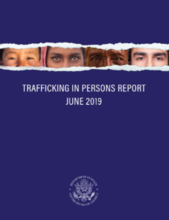The U.S. State Department Trafficking in Persons Report sheds light on the practices of modern slavery around the world and highlights specific steps governments can take to protect victims of human trafficking, prevent trafficking crimes, and prosecute traffickers in the United States and around the world. This year's report "takes a deeper dive into one such gap, common in many countries around the world, whereby governments concentrate on transnational human trafficking cases at the expense of cases taking place within their borders. This spotlight is not intended to suggest that transnational human trafficking is not also important, or that the many other forms of trafficking that may go unaddressed due to similar oversight are of lesser consequence, but rather to call on governments to ensure they are addressing all forms of human trafficking and finding a balanced approach."
The report includes several references to the links between orphanages and trafficking in relation to Nepal, Nigeria, Cambodia, Haiti, Sri Lanka, Moldova, and other countries, including the increased vulnerability to trafficking experienced by children in institutions, as well as the practice of orphanage trafficking itself. In regards to orphanage trafficking in Cambodia, for example, the report reads: "Some Cambodian orphanages purchase local children from economically disadvantaged families and subject them to malnutrition and unclean living conditions in their facilities for the purpose of attracting and profiting from charitable donations; some of these children are at further risk of sex trafficking and domestic servitude as a result of poor government oversight of adoption processes. Endemic corruption aids and abets trafficking crimes."
The report also highlights efforts to move away from institutional care of children such as in Croatia, where "the government moved toward implementation of foster care and away from using state child care institutions to mitigate traffickers targeting children from state orphanages," and Haiti where the government has made efforts to close abusive orphanages. According to the report, the government social welfare agency of Haiti (IBESR), "after completing an assessment of more than 750 orphanages with another government and international NGOs, identified 3,019 potential victims of trafficking in those institutions." In Haiti, "IBESR closed eight orphanages found not in compliance during the reporting period. The government accredited 45 more foster families for a total of 121 families, as part of its expanded foster care program to make children less vulnerable to trafficking or being re-victimized."

